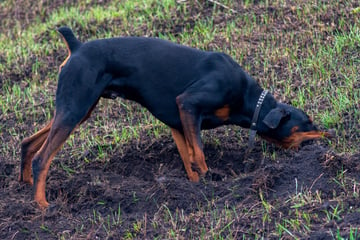Dog bug bites: How to treat them and what to look out for
Warm weather can be a lot of fun when you have a dog. The problem, though, is that heat means insects – and they can be not so pleasant. Can dogs get bitten by bugs? And how do you treat dog bug bites anyway? Our dog guide is here to help.

Nobody likes to be bitten by mosquitos, and no one likes to be stung by bees.
Humans are lucky, though, because while bites might be painful, we are unlikely to get super sick from a mosquito or wasp attack – usually. For dogs, insect bites can be a different story.
You might notice a bit of swelling, a great deal of discomfort, or a few obvious bites on your pip. The biggest risk, of course, is the no-so-easily noticed bites, which are harder to detect.
Whatever the case, a bug bite on a dog should be handled with care.
So what's behind big bites and canines? What are the symptoms and how can you treat them? Read on for everything you need to know.
Detect dog bug bites on paws, belly, and ears
Insect bites are most commonly found on a dog's paws, belly, and ears. Our four-legged friends enjoy a good romp in the park or a field, yet it's incredibly common that these joyful jaunts are the source of potentially dangerous bug bites.
A dog's ears can form nets for insects like wasps and bees when a dog chases them, making them a danger point for possible bites or stings. As for their bellies and paws, the reasoning is pretty simple - these parts of the body are closer to the ground, grass, and dirt, and are therefore more easily attacked by an annoyed insect.
Dog owners should check these areas of their dog's body regularly to make sure that they haven't been bitten or stung. They can be difficult to check, but worth it to keep your pup healthy and happy!
How to prevent dog insect bites
Dogs are funny fellows, and will chase all sorts of things. From birds, to rats, to insects, it can cause a real problem if your dog is too adventurous. You'll want to take some precautions to avoid your dog being bitten or stung.
Here are a few precautions that you can take to avoid a dog's bug bite:
- Regularly check your dog's food and water bowls for insects.
- Remember to not leave your dog's food open or outside for long periods of time.
- Don't feed your pooch outside.
- Keep your dog away from visible beehives and wasp nests.
- Train your dog well so that you can get it to stop chasing insects when necessary.
- Pick up and dispose of fallen fruit from trees.
- Take your dog to parks with mown grass, rather than tall meadows with lots of wild flowers that attract insects.
- Pick up dog-specific insect repellents, and use after consultation with your veterinarian.
- Make sure that you always know where the nearest vet is located.
It's incredibly important that you take precautions to prevent your dog from being bitten by bugs and insects. They can get very sick, and you don't want that.
Keep in mind: If your dog is being taken care of by a dog sitter or friend, they should be informed on precautions to take against bug bites.
Dog bug bite symptoms
It can be quite easy to tell when a dog gets stung by an insect, especially by a wasp or bee. The problem comes, though, when your dog gets stung without you noticing, as the symptoms of a bite can be quite subtle.
Here are a few dog bug bite symptoms to look out for:
- Loud yelping or whining when bitten.
- Suddenly running away when bitten.
- Violent licking, scratching, or biting of a body part that has been stung or bitten (it could be itchy).
- Compulsive rubbing of the effected area on the ground, trees, or other surfaces.
- Serious restlessness.
- Reddening of the skin, bloodshot eyes.
- Swelling or bulging on a dog's body.
- Limping or commonly taking up specific postures to relieve itself from itching or pain.
Normally, a dog bug bite will itch and swell for a few hours or, at max, a day or two. If it lasts longer, or is accompanied by other symptoms, you need to take it to the vet.

Recognize dangerous dog bug bites
While most dog bug bites are relatively harmless, some can cause serious health issues and even death. Risks can especially come when a doggo is bitten or stung in the oral cavity or in the respiratory tract area. This can happen if your pooch accidentally swallows a wasp or a bee, or something similar.
These are possible signals of a dangerous bite:
- Swelling of the face, muzzle, or throat
- Difficulty breathing or clear shortness of breath
- Coughing
- Retching and vomiting
- Excessive salivation
If your dog starts showing any of these symptoms, they could be getting very sick. You need to seek medical advice immediately in such cases.
Please note: Small dogs are significantly less capable of tolerating insect venom than larger dogs. If your dog is small and has been stung or bitten, pay special attention, and seek help from a vet or animal hospital.
Can dogs have allergic reactions to bug bites?
The problem with insect bites is that they can cause all sorts of health issues. It's not just about whether the critters poison our pooches, or if the bite gets infected, but also whether the dog is allergic.
If it turns out that a dog is allergic to a bite, it can be life-threatening. It's much the same in humans - some people can go into anaphylactic shock from something as simple as a bee sting. As a result, if your dog shows any signs of being allergic to a bug bite, you must take it immediately to the veterinarian.
The signs of allergic reaction can include:
- Shaking
- Staggering
- Apathy
- Weakness or unconsciousness
- Rapid and/or shallow breathing
- Shortness of breath
- Pale or white-colored mucous coming from the mouth
- Significantly increased salivation
- Retching and/or vomiting
- Diarrhea
- Fever
- Dry cough
- Seizure
- Rash or hives
How to recognize an infected bug bite on a dog
If you are facing a dog bite infection, action will need to be taken as quickly as possible. These infections can spread, causing serious health issues such as high fevers, weakened immune systems, or in extreme cases, gangrene (though this is exceptionally rare).
Common signs of an infected dog bug bite include:
- Swelling and redness near the bite itself
- Clear difficulty breathing or swallowing
- Vomiting, retching, or diarrhea
- Swelling on other parts of the dog, such as the face or nose
Many of the signs described as symptoms of an allergic reaction could also indicate an infected bite wound. In either case, a veterinarian should be contacted right away.

What to do about dog bug bites
Insect bites can be life-threatening for dogs, especially if they are not taken seriously or fester to become infected. Your first port of call, if the symptoms are mild, is to implement a few home care strategies.
Here is how to perform first aid on a dog's bug bite:
Step 1: Make sure to keep calm, and to also keep the dog as relaxed and calm as possible.
Step 2: Locate the site of the bite, first looking on the dog's paws, ears, and belly for puncture marks. If there is a stinger present (for example, from a bee), carefully remove it without bursting or crushing it, as it may still have an intact venom reservoir.
Step 3: Use an ice pack or a bag of peas (or something similar) from the freezer to cool the affected area, gently pressing on the bite or sting. If the sting is in a difficult location (such as in its mouth, nose, etc.), you will want to apply something that's safe for the dog and will still sooth that particular area.
Tip: Try animal safe, lactose-free cold yogurt for bites in the mouth and throat.
After being stung or bitten by a bug, you should observe your doggo for at least two hours, watching for any alarming symptoms that might require professional attention.
Dog bug bite treatments and home remedies
The most important thing to do if your dog gets bitten or stung by a bug is to cool down the affected area. Home remedies can help to sooth their discomfort, but won't solve anything if your dog gets seriously sick.
Some calming and soothing home remedies for dog insect bites include:
- Chopped up parsley or basil applied as a paste to the sting or bite.
- Apply a lactose-free curd, if available
Attention: Onion works well as a home remedy for mosquito and insect bites for humans, but is not appropriate for dogs. It may surprise you, but onion is toxic and sometimes even life-threatening for dogs.
Be cautious of insect bites on dogs
Dog bug bites are seriously dangerous for their health, and should be taken seriously. Home remedies and treatments should only be used in the case of a bite that results in little-to-no symptoms.
If your dog has been bitten or stung by an insect and displays any of the signs outlined, they must be taken immediately to the vet for a check-up. Keep calm, and it will help ease your pup's pain, too.
Cover photo: Unsplash / Kanashi




